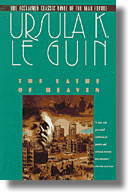| Ursula
K. LeGuin F |
| Nebeski
strug Ursula K. LeGuin
His increasingly frantic abuse of sleep-altering drugs lands him in the office of a struggling psychiatrist, Dr. William Haber, under compulsory treatment. Still, Orr is optimistic: Haber's specialty is dreams, and he's invented a device--the Augmentor--that stabilizes the dream state. Orr placidly submits to hypnotic therapy, hoping to eliminate his "effective" dreams entirely. After a few sessions, however, Orr suspects that Haber--because he's guiding the dreams and is with Orr at the epicenter--is aware that his effective dreaming is not just a paranoid delusion, but a real phenomenon, a tantalizing instrument of power. Orr brings a lawyer, Heather LeLache, to the next session, in which he is directed to dream about alleviating overpopulation. Heather is terrified and sickened to find herself suddenly in an altered, unpeopled world, her mind seared by a new memory of watching billions die from plague many years before. The changes grow more dramatic, but Haber is frustrated with the slippery nature of Orr's subconscious. When he suggests world peace, the new reality finds humanity banded together against imminent alien destruction. But in another reality the aliens are benevolent, and with their help and Heather's, Orr finds balance. He faces Haber, urging him to give up his plan to acquire Orr's ability through the Augmentor, which has been analyzing his dreaming mind. But as Orr leaves Haber's office, the city begins to melt and crash--and Orr knows that the well-meaning doctor now has the power to destroy everything, everywhere, for all time. Classic, mesmerizing SFUrsula Le Guin has the rare ability to attain the full potential of science fiction literature. In this slim volume, Le Guin creates a classic, mesmerizing SF scenario and brings it to life with characters who are not only instantly memorable, but who epitomize easily-recognized, primal instincts. Haber, the well-meaning idealist, is sure that noble ends justify any means. He contrasts perfectly with untainted Orr, who's able to see all the worlds that the splitting of dreams has made. The opening scenes introduce readers up to the horror of his situation; after that, it's impossible to leave his side. Part of the joy of this novel is how symbolism is beautifully enmeshed in the fabric of the story. Haber is working for a better world, yet his increasing grandeur in each succeeding reality reveals that his claim to know best is a conceit. Heather LeLache is a complicated character, the hard-bitten daughter of a mixed marriage. What's most poignant about her, though, is her absence in a reality in which race hatred has been eliminated by eliminating racial diversity. She neatly symbolizes what can be lost when power surpasses understanding. The shifting realities also highlight the environmental and social dangers dangling perilously over humanity. The urgency of the crises Orr sees all around him underscores the tragedy of Haber's surrender to temptation. All of this is told in Le Guin's distinctively lyrical yet straightforward voice. The narrative tone itself is a delight: clever, sober, powerful and whimsical, yet always natural, never calling attention to itself. No one else conveys meaning so cleanly, elegantly and wryly. The Lathe of Heaven deserves to stand with The Left Hand of Darkness and The Dispossessed as a masterpiece of science fiction. |
 George
Orr desperately wants to keep from dreaming, but not
because he's having nightmares. Orr knows his most
vivid dreams change reality, seamlessly and
retroactively. Only he remembers the way things were
before, in superseded realities where a volcano did
not erupt or a disliked aunt was still alive.
George
Orr desperately wants to keep from dreaming, but not
because he's having nightmares. Orr knows his most
vivid dreams change reality, seamlessly and
retroactively. Only he remembers the way things were
before, in superseded realities where a volcano did
not erupt or a disliked aunt was still alive.